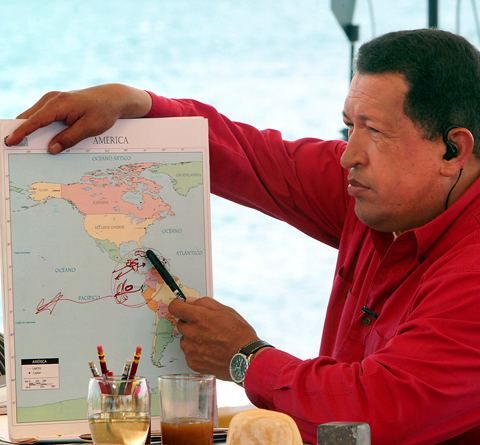Venezuelan President Hugo Chavez on Sunday dispatched the navy to Venezuela’s seaports, warning that state governors who challenge a new law bringing transportation hubs under federal control could end up in prison.
Speaking during his weekly television and radio program, Chavez ordered naval vessels to seize control this week of Port Cabello in Carabobo State and Maracaibo Port in Zulia State — two of Venezuela’s largest seaports.
Then he singled out the opposition-sided governors of those states — Carabobo Governor Henrique Salas and Zulia Governor Pablo Perez — and told military officers they might decide to flout the newly approved law.

PHOTO: AFP
“If he gets smart ... that deserves prison,” Chavez said of Salas. “The same goes for the governor of Zulia.”
Lawmakers loyal to Chavez voted last week to bring all airports, highways and seaports under federal control, a move government adversaries said was designed to expand the president’s power.
“This is a national security issue,” Chavez said on Sunday, defending the law.
The socialist leader accused “corrupt” governors of allowing drug smuggling through airports and seaports previously under their administration to thrive and he promised a government crackdown.
“We’ve given drug trafficking tough blows, but we must recognize that they still have some bases in the ports and airports,” Chavez said.
Opposition governors warned that the law approved last week by the Chavista-dominated National Assembly is designed to strangle the president’s foes financially and to undermine support from constituents who elected them in November.
Under the law, states and municipalities can no longer collect tariffs at transportation hubs or establish tolls along highways, meaning governors and mayors will have less money for local public projects.
Also on Sunday, Chavez said that Russian bombers would be welcome in Venezuela, but the socialist leader denied that his country would offer Moscow territory for a military base.
Chavez — a fierce critic of Washington, with close ties to Russia and Cuba — said his government did not raise the possibility, as Russian media had reported.
“It’s not like that,” the president said, responding to a report by Interfax news agency quoting the chief of staff of Russia’s long range aviation, Major General Anatoly Zhikharev, as saying some strategic bombers could be based on an island offered by Venezuela.
Zhikharev reportedly said on Saturday that Chavez had offered “a whole island with an aerodrome, which we can use as a temporary base for strategic bombers.”
Speaking during his weekly television and radio program, Chavez said he told Russian President Dmitry Medvedev that his nation’s bombers would be allowed to land in Venezuela if necessary, but no such plans had been made.
Venezuela hosted two Russian Tu-160 bombers in September for training flights and joined Russian warships two months later for naval exercises in the Caribbean.

In the sweltering streets of Jakarta, buskers carry towering, hollow puppets and pass around a bucket for donations. Now, they fear becoming outlaws. City authorities said they would crack down on use of the sacred ondel-ondel puppets, which can stand as tall as a truck, and they are drafting legislation to remove what they view as a street nuisance. Performances featuring the puppets — originally used by Jakarta’s Betawi people to ward off evil spirits — would be allowed only at set events. The ban could leave many ondel-ondel buskers in Jakarta jobless. “I am confused and anxious. I fear getting raided or even

POLITICAL PATRIARCHS: Recent clashes between Thailand and Cambodia are driven by an escalating feud between rival political families, analysts say The dispute over Thailand and Cambodia’s contested border, which dates back more than a century to disagreements over colonial-era maps, has broken into conflict before. However, the most recent clashes, which erupted on Thursday, have been fueled by another factor: a bitter feud between two powerful political patriarchs. Cambodian Senate President and former prime minister Hun Sen, 72, and former Thai prime minister Thaksin Shinawatra, 76, were once such close friends that they reportedly called one another brothers. Hun Sen has, over the years, supported Thaksin’s family during their long-running power struggle with Thailand’s military. Thaksin and his sister Yingluck stayed

Kemal Ozdemir looked up at the bare peaks of Mount Cilo in Turkey’s Kurdish majority southeast. “There were glaciers 10 years ago,” he recalled under a cloudless sky. A mountain guide for 15 years, Ozdemir then turned toward the torrent carrying dozens of blocks of ice below a slope covered with grass and rocks — a sign of glacier loss being exacerbated by global warming. “You can see that there are quite a few pieces of glacier in the water right now ... the reason why the waterfalls flow lushly actually shows us how fast the ice is melting,” he said.

RESTRUCTURE: Myanmar’s military has ended emergency rule and announced plans for elections in December, but critics said the move aims to entrench junta control Myanmar’s military government announced on Thursday that it was ending the state of emergency declared after it seized power in 2021 and would restructure administrative bodies to prepare for the new election at the end of the year. However, the polls planned for an unspecified date in December face serious obstacles, including a civil war raging over most of the country and pledges by opponents of the military rule to derail the election because they believe it can be neither free nor fair. Under the restructuring, Myanmar’s junta chief Min Aung Hlaing is giving up two posts, but would stay at the